Zelch 128
By
Introduction:
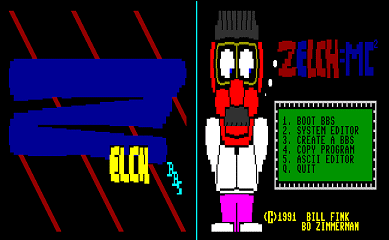 Zelch 128 is the crowning achievement of Elite Software, which
consists of myself (Bo Zimmerman) and Bill Fink (see "Elite BBS"). It began
when myself and Bill, then fellow SysOps of Zelch 64 and C-Net 128 BBSs
respectively, were discussing our past work on our own ventures into BBS
software programming. Bill had a brilliant idea of a BBS program that was
basically an interpretor for a BBS language consisting of commands and
data fields. The program would be event driven, loading menus and executing
miniature BBS programs whenever the activation key was pressed, assuming
the user had access to the little "program". The idea was to have a BBS
program so versatile that it might emulate other BBS programs. This way, we
could reconcile our EXTREMELY different visions of what a BBS should look
like in a single program. In this, Zelch 128 was born.
Zelch 128 is the crowning achievement of Elite Software, which
consists of myself (Bo Zimmerman) and Bill Fink (see "Elite BBS"). It began
when myself and Bill, then fellow SysOps of Zelch 64 and C-Net 128 BBSs
respectively, were discussing our past work on our own ventures into BBS
software programming. Bill had a brilliant idea of a BBS program that was
basically an interpretor for a BBS language consisting of commands and
data fields. The program would be event driven, loading menus and executing
miniature BBS programs whenever the activation key was pressed, assuming
the user had access to the little "program". The idea was to have a BBS
program so versatile that it might emulate other BBS programs. This way, we
could reconcile our EXTREMELY different visions of what a BBS should look
like in a single program. In this, Zelch 128 was born.
It should be noted that Zelch 128 is NOT a venture of Planet Ink.,
and is NOT the Commodore 128 version of Zelch 64. The name of the BBS was
part of a compromise: I got to name the program, Bill got to name our
business.
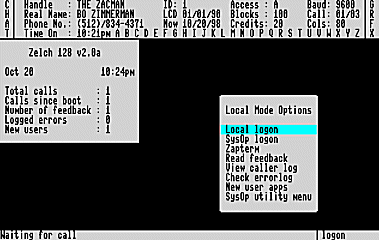 Elite Software marketed and distributed the BBS program starting and ending
with Zelch 2.0. 1.0 was never released to the public. However, despite our
great pride in our product, it takes money to market, and we had none. Besides,
it was 1991, and the Commodore 128 was already on its way out.
Elite Software marketed and distributed the BBS program starting and ending
with Zelch 2.0. 1.0 was never released to the public. However, despite our
great pride in our product, it takes money to market, and we had none. Besides,
it was 1991, and the Commodore 128 was already on its way out.
Pictured here is the waiting for call screen, with the options menu popped
up.
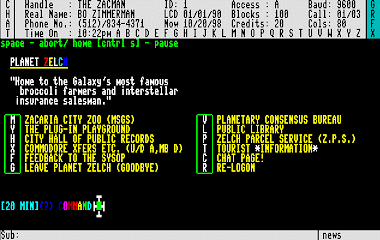 Zelch 128 was, and is, a rival to its peers. More versatile then any other
program might dream, including access to an on-line BASIC interpretor, ANSI
and COMPLETE Color/Graphics support, powerful SysOp controls and utilities,
structured message bases, 80 to 40 column text translation, on-line games,
networking capability, access to variables and system data inside text files,
REU support, a powerful and full-featured transfers area,
hotkey and word command style menu support, and our undying motto:
"Zelch 128 can EMULATE any BBS program you can name!".
Pictured to the right here is one possible main menu configuration. Below is
another.
Zelch 128 was, and is, a rival to its peers. More versatile then any other
program might dream, including access to an on-line BASIC interpretor, ANSI
and COMPLETE Color/Graphics support, powerful SysOp controls and utilities,
structured message bases, 80 to 40 column text translation, on-line games,
networking capability, access to variables and system data inside text files,
REU support, a powerful and full-featured transfers area,
hotkey and word command style menu support, and our undying motto:
"Zelch 128 can EMULATE any BBS program you can name!".
Pictured to the right here is one possible main menu configuration. Below is
another.
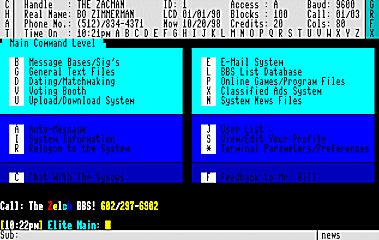
The Facts:
Hardware Information
Computer : Commodore 128 in 128 mode
Video : 40 or 80 column support
Drives : All CBM drives, CMD (part. ok, no subdirs), REU drive
Modems : 1650, 1660, 1670, Hayes 300-2400 baud
Input : Keyboard, and joystick/1350 mouse
Output : Printer (optional)
RAM use : Ramdrive REU support
Special :
General
Pgm Struct : Base program with numerous small overlay modules
Menu Struct : Event driven programs of op-codes, hotkey or words
Translation : ASCII, full Commodore color/graphics, ANSI output
Access : 26 cus. levels, 26 cus. user access flags, SubOps
Handle/ID : Handles allowed, users listed by ID
User info : Handle, name, phone, age, numerous flags, etc.
User Logs : Keystroke log for each user
Calls/Time : Definable for each access level, idle time supported
Network : Proprietary system ZelchNet
Customizing : Easy and complete
Programs : BASIC interpreted code, easy to change
Displays : All files and output text is customizable
Commands : Actions of all menu commands are programable
Areas : Only a first menu and a sysop menu are defined
E-mail : Op-codes may appear in any menu
Messages : "
Transfers : "
Network : "
Programs : "
Text : "
User Cmds : "
SysOp : "
Voting : ", selection and free entry systems
News : "
Help : None provided, software documentation only
Other : Scripts are also supported
SysOp Utilities and Support
Offline : Menu, SEQ file, user, and configuration editors
Online : System setup utilities, terminal program, etc.
Remote : Complete user and system setup utilities
On-L Display: User info windows, pull-down SysOp utility menu
W.F.C. Utils: BASIC shell, sysop menu, term program, "gate" controls
Chatting : Interrupt driven, may chat anywhere input is scanned
User : Complete user editors
Msg Bases : Message base editors, fixers, msg editors, SubOps
Transfers : Via CBM-DOS shell, and transfer base editors, SubOps
Programs : Via BASIC shell; changes to main program require reboot
Network : Networking systems and passwords editor only
Drives : CBM-DOS shell, or op-codes for particular functions
Terminal : Upload/Download, ASCII/PETSCII, no buffer, no ANSI
News
Structure : News files are maintained by news op-codes
Header : Title, new-until date, delete date, access
Weeding : During auto-maintenance
Display : At logon (if still new), or on command
Messages
Structure : Structured topic/reply system
Bases : Named bases, listed by letter
Limits : Separate limits for topics and replies per base
: Weeded during auto-maintenance
Reading : By number, global and local New reading
Headers : Handle, date, subject
Format : Color/Gfx, variable codes, 40/80 col translation
Writing : New posts, or replies to previous posts
Anonymous : Supported if access allowed
Network : Supported
Other :
Message Editor
Structure : Line editor
Commands : Menu or meta-commands from beginning of a line
Editing : Search/replace, or line replacing
Formatting : Word wrap, line numbers, uppercase gfx, (all optional)
Graphics : Full Color/GFX, cursor movements, smart delete
Transfers
Bases : Named bases, listed by letter
Storage : Files are marked in filenames as belonging to bases
Limits : File and capacity limits per base
Credits : Definable ratios
Protocols : Xmodem, Punter (multi)
Headers : Name, date, uploader, description, size
Selection : By name, or Yes/No for multi
Listing : Directories only
Network : Not supported
Other :
Text Libraries
Structure : Only as text files accessed by SEQ file op-codes
Storage : As normal text files
Network : Not supported
Other :
E-Mail
Structure : Series of op-codes accessible from anywhere
Sending : By ID number or Handle
Receiving : On request, or at log-on
Network : Supported
Other : Listing also supported
Program Libraries
Structure : Imp. as op-codes which run BASIC or online modules
Programs : Modules which interact with BBS, or standard BASIC programs
Network : Not supported
Other : Most BASIC programs will run on-line
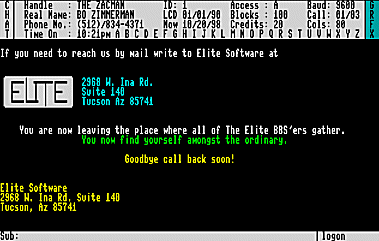
If you find anything in here you have questions or comments about, feel
free to leave me email right here.
To return to my home page, click here.
 Zelch 128 is the crowning achievement of Elite Software, which
consists of myself (Bo Zimmerman) and Bill Fink (see "Elite BBS"). It began
when myself and Bill, then fellow SysOps of Zelch 64 and C-Net 128 BBSs
respectively, were discussing our past work on our own ventures into BBS
software programming. Bill had a brilliant idea of a BBS program that was
basically an interpretor for a BBS language consisting of commands and
data fields. The program would be event driven, loading menus and executing
miniature BBS programs whenever the activation key was pressed, assuming
the user had access to the little "program". The idea was to have a BBS
program so versatile that it might emulate other BBS programs. This way, we
could reconcile our EXTREMELY different visions of what a BBS should look
like in a single program. In this, Zelch 128 was born.
Zelch 128 is the crowning achievement of Elite Software, which
consists of myself (Bo Zimmerman) and Bill Fink (see "Elite BBS"). It began
when myself and Bill, then fellow SysOps of Zelch 64 and C-Net 128 BBSs
respectively, were discussing our past work on our own ventures into BBS
software programming. Bill had a brilliant idea of a BBS program that was
basically an interpretor for a BBS language consisting of commands and
data fields. The program would be event driven, loading menus and executing
miniature BBS programs whenever the activation key was pressed, assuming
the user had access to the little "program". The idea was to have a BBS
program so versatile that it might emulate other BBS programs. This way, we
could reconcile our EXTREMELY different visions of what a BBS should look
like in a single program. In this, Zelch 128 was born. Elite Software marketed and distributed the BBS program starting and ending
with Zelch 2.0. 1.0 was never released to the public. However, despite our
great pride in our product, it takes money to market, and we had none. Besides,
it was 1991, and the Commodore 128 was already on its way out.
Elite Software marketed and distributed the BBS program starting and ending
with Zelch 2.0. 1.0 was never released to the public. However, despite our
great pride in our product, it takes money to market, and we had none. Besides,
it was 1991, and the Commodore 128 was already on its way out.  Zelch 128 was, and is, a rival to its peers. More versatile then any other
program might dream, including access to an on-line BASIC interpretor, ANSI
and COMPLETE Color/Graphics support, powerful SysOp controls and utilities,
structured message bases, 80 to 40 column text translation, on-line games,
networking capability, access to variables and system data inside text files,
REU support, a powerful and full-featured transfers area,
hotkey and word command style menu support, and our undying motto:
"Zelch 128 can EMULATE any BBS program you can name!".
Pictured to the right here is one possible main menu configuration. Below is
another.
Zelch 128 was, and is, a rival to its peers. More versatile then any other
program might dream, including access to an on-line BASIC interpretor, ANSI
and COMPLETE Color/Graphics support, powerful SysOp controls and utilities,
structured message bases, 80 to 40 column text translation, on-line games,
networking capability, access to variables and system data inside text files,
REU support, a powerful and full-featured transfers area,
hotkey and word command style menu support, and our undying motto:
"Zelch 128 can EMULATE any BBS program you can name!".
Pictured to the right here is one possible main menu configuration. Below is
another.

